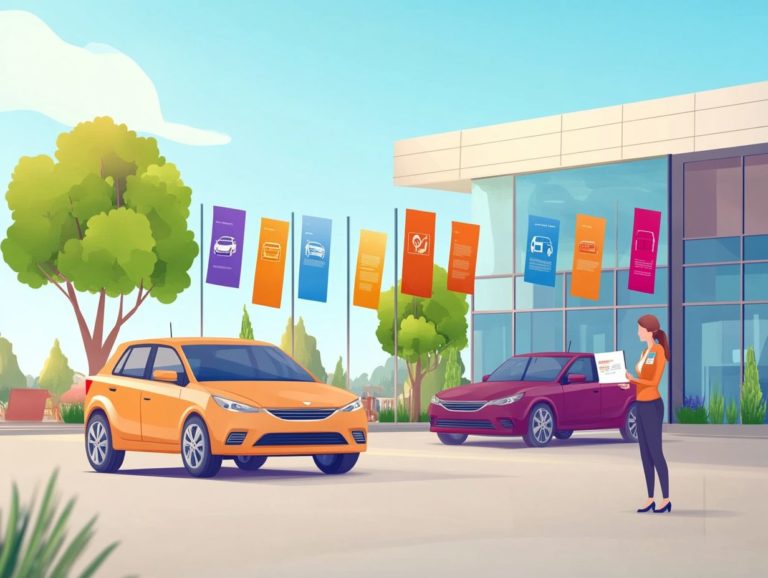Tips for Buying a New Car During a Recession
In today s uncertain economy, buying a car can feel overwhelming. A recession can tighten your budget and influence your choices.
This article highlights the key factors to consider before purchasing a car. We ll cover evaluating your finances and understanding your future needs.
Learn how to research options, negotiate with dealerships, and explore financing methods. Also, discover cost-effective maintenance strategies.
Equip yourself with the insights you need to navigate the car-buying journey wisely, especially now.
Contents
- Key Takeaways:
- Impact of Recession on Car Buying
- Factors to Consider Before Buying a Car
- Maintaining Your New Car During a Recession
- Frequently Asked Questions
- What are some tips for buying a new car during a recession?
- Should I consider buying a used car instead?
- Is it a good idea to negotiate on the price during a recession?
- Should I avoid buying a luxury car during a recession?
- What are some other ways to save money when buying a new car during a recession?
- Is it a good idea to finance a new car during a recession?
Key Takeaways:

Consider your budget and future needs before buying a car. Research options to find the best deals. Negotiate effectively with dealerships. Look into alternative financing and cost-effective maintenance to save money.
Impact of Recession on Car Buying
The recession can significantly affect your car-buying habits. Economic downturns can change how you approach purchasing a vehicle.
For example, during the Great Recession of 2008, car sales varied greatly. Consumer sentiment and auto prices shift, and dealership incentives often decrease due to high interest rates.
As you look ahead to 2024 and 2025, understanding these trends is crucial, whether you’re buying or selling.
Understanding the Current Market
To understand today’s car market, consider the ongoing inflation rates and economic conditions in Canada and the U.S. These factors heavily influence your buying decisions.
Inflation impacts the affordability of new cars and shapes buyer sentiment. As costs rise for everyday items, you may have less money available for major purchases.
This often shifts attention to the used car market, where budget-friendly options can maximize your investment.
Dealerships must adapt their strategies to attract you. They need to engage buyers effectively while managing inventory to match changing preferences.
Ultimately, they want to create attractive offers that appeal to even the most hesitant buyers.
Factors to Consider Before Buying a Car
Before buying a car, think about critical factors. Start with a close look at your budget and financial situation.
This assessment helps you make informed decisions on financing and payment options that fit your financial strategy.
Budget and Financial Stability
Budgeting and financial stability are crucial when buying a car. They influence your payment structure and ownership experience.
When making a big purchase, consider the initial cost and ongoing expenses, like insurance and maintenance.
Taking a comprehensive approach helps avoid overspending on non-essentials. This way, you ll keep your finances secure.
By setting a realistic budget, you can assess your financial health. This enables you to choose a vehicle that fits your budget without jeopardizing your future.
Strategies like tracking expenses and saving for unexpected repairs are essential for maintaining stability after your purchase.
Future Car Needs

Considering your future car needs is essential, especially with the rise of emerging technologies like electric vehicles and hybrid powertrains that can transform your transportation choices.
By recognizing the rapid pace of innovation in the car market, you can better assess how your preferences might change over the next few years.
As the market increasingly leans toward greener options, it s not only about fuel savings; it s also important to consider the long-term value these vehicles offer.
Financial planning is crucial in this journey, as it prepares you for potential extra costs, such as the equipment needed to charge electric vehicles or maintenance.
Keeping an eye on government incentives can lead to significant savings, making now the perfect moment to invest in the latest options that match your values and budget!
Researching and Comparing Car Options
Researching and comparing car options is a vital step for you as a car buyer, especially in a fluctuating market where dealership incentives shift and car sales trends vary.
This diligence not only helps you make informed decisions but also positions you to seize the best opportunities available.
Best Cars for a Recession
To find the best cars during a recession, focus on planning your budget. Keep an eye on changing used car prices and dealership offers during these challenging economic times.
In periods of financial uncertainty, vehicles that emphasize fuel efficiency, reliability, and affordability become highly appealing.
With fuel costs rising, it s natural to gravitate toward models that promise exceptional mileage, easing some financial burdens.
Reliability is key; you want a vehicle that won t constantly need repairs or maintenance that could drain your wallet.
During an economic downturn, you may notice shifts in used car prices, often making them more accessible. Savvy shoppers can uncover fantastic deals on pre-owned models, presenting great opportunities to save.
Dealership incentives can also provide financial relief, offering options that can influence your decision-making process during tough times.
Dealership Negotiation Tips
When you start the journey of buying a car, mastering the art of negotiation can pave the way for favorable terms, especially when you effectively leverage dealership incentives to align with your financial goals.
By entering discussions well-informed about current deals, special financing options, and manufacturer rebates, you significantly bolster your bargaining power.
Understanding these elements lays a strong foundation for negotiation and allows you to communicate your budgetary constraints clearly.
Conducting thorough research on the vehicle’s value while remaining flexible in discussions is essential. This thoughtful approach enables you to explore various financing options, ensuring that the final agreement fits your long-term financial aspirations.
Financing Options for a New Car
Exploring financing options for a new car is crucial for you as a car buyer, especially when evaluating the different vehicle financing methods available.
Understanding how these options influence your overall car payment structure is vital, particularly in light of any credit challenges you may face.
Dealing with Credit Challenges

Dealing with credit challenges can feel overwhelming as a potential car buyer. These issues directly influence your vehicle financing options and payment plans. Navigating these hurdles is essential for your financial well-being.
One effective strategy to enhance your credit score is to consistently make on-time payments on your current debts. This approach showcases your reliability to lenders. Considering credit repair services can also help you address inaccuracies on your credit report that may be dragging down your scores.
If you’re looking for financing despite having poor credit, explore options such as credit unions or specialized dealership programs. These alternatives can offer potentially better terms and are vital for your financial planning.
Improving your credit situation paves the way for more manageable car payments, allowing you to secure the vehicle you need without straining your budget.
Alternative Financing Methods
Alternative financing methods are gaining traction among car buyers facing credit challenges. These innovative options expand your purchasing power and promote thoughtful choices.
For example, borrowing money from individuals directly, often at competitive rates, sidesteps the traditional banking system. Buy-here-pay-here dealerships are another compelling alternative for those with limited credit histories, offering a personalized purchasing experience.
Many manufacturers provide tailored financing programs, making new vehicles more accessible than ever. By incorporating these methods into your broader financial strategy, you can enhance your long-term stability while ensuring your vehicle purchase aligns seamlessly with your budget and financial goals.
Maintaining Your New Car During a Recession
Maintaining your new car during a recession requires strategic and cost-effective practices. These not only secure long-term savings but also uphold the value of your vehicle ownership.
By adopting a thoughtful approach to maintenance, you can navigate economic challenges and ensure your car remains in optimal condition for years to come.
Cost-Effective Maintenance Strategies
Implementing cost-effective maintenance strategies is essential for car buyers aiming to maximize their investment. Keeping vehicle ownership affordable, even during economic challenges, is key.
Proactive measures like performing DIY repairs and scheduling regular servicing can extend your car’s life and significantly reduce operating costs. Monitoring performance through routine checks allows you to catch potential issues early, saving you from costly repairs down the line.
These practices help maintain your vehicle in peak condition and play a critical role in preserving its resale value. Embracing budget-friendly maintenance strategies offers a dual advantage: ensuring reliable performance while keeping long-term expenses in check.
Long-Term Savings Tips
Grasping long-term savings tips can significantly elevate the vehicle ownership experience and enhance your financial planning.
Focus on essential factors such as fuel efficiency, selecting reliable vehicles, and committing to regular maintenance. These will truly maximize your investment.
Choosing cars with lower fuel consumption trims your monthly expenses at the pump while reducing your overall environmental footprint. Opting for vehicles known for their reliability helps you avoid costly repairs and replacements down the road.
Although regular maintenance may require an initial investment of time and effort, it ensures your vehicle operates smoothly, prolongs its lifespan, and prevents dreaded breakdowns that can drain your finances.
Together, these strategies enable you to make financially savvy decisions that promise substantial benefits over time.
Frequently Asked Questions

What are some tips for buying a new car during a recession?
1. Research before buying. Compare prices from different dealerships to find the best deal during a recession.
Should I consider buying a used car instead?
2. Yes! Used cars are often more affordable and still have plenty of life left. Make sure to have a trusted mechanic inspect the car before purchasing.
Is it a good idea to negotiate on the price during a recession?
3. Absolutely! Car dealerships are usually more open to negotiation during a recession. Don t hesitate to ask for a lower price or additional incentives. Now is the perfect time to negotiate!
Should I avoid buying a luxury car during a recession?
4. Generally, it’s wise to avoid luxury cars. They come with higher price tags and might not be the best choice during financial uncertainty.
What are some other ways to save money when buying a new car during a recession?
5. Consider a car with a smaller engine, as these are typically more fuel-efficient, meaning they use less gas for the distance they travel, and are usually less expensive. Also, think about opting for a basic model instead of one loaded with features.
Is it a good idea to finance a new car during a recession?
6. It depends on your financial situation. If you have a stable income and can manage the monthly payments, financing might be a good option. However, if you’re unsure about your financial stability, it might be better to wait or consider a used car instead.






